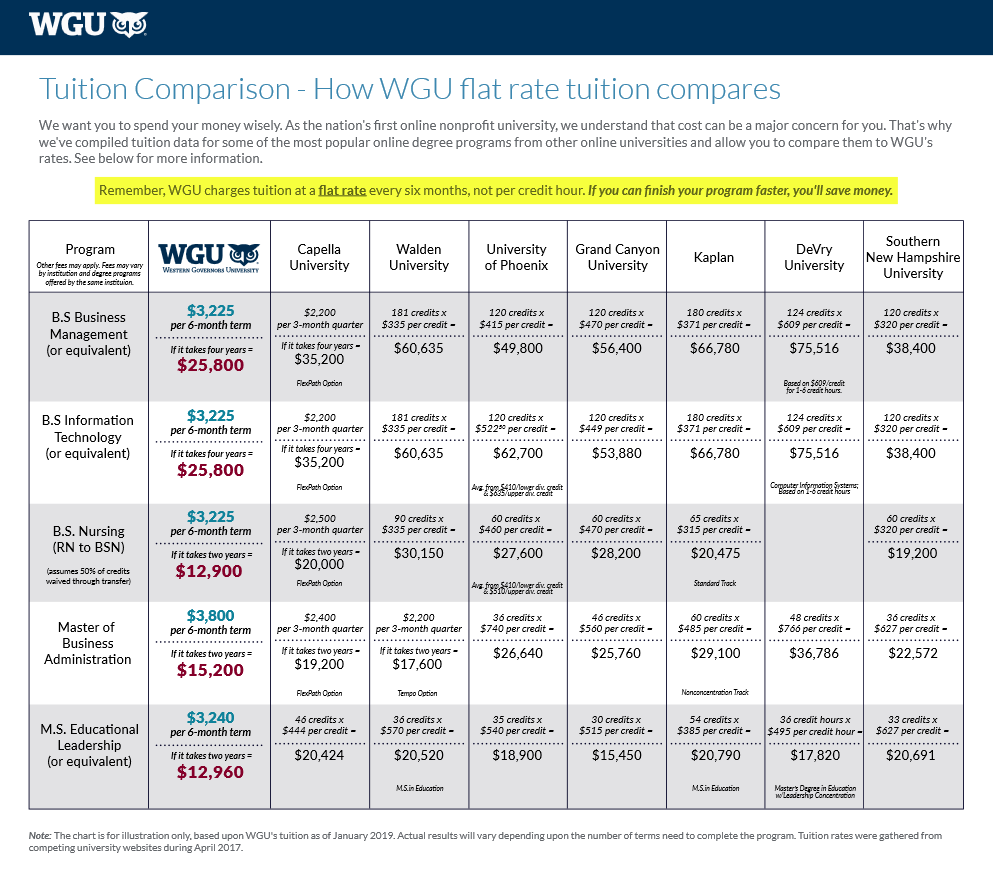FAQs About Master’s Degree in Cybersecurity from WGU

On November 1, 2016 I wrote an article about Master of Science in Cybersecurity and Information Assurance from Western Governors University (WGU). Since that review I have been asked a lot of questions, mostly by people who already have a lot of experience in the industry and are considering a master’s degree in cybersecurity. I know some of these folks personally, but others have read my article and have been sending me questions about WGU in general and the master’s program in particular. Here are some of the frequently asked questions (FAQs) that you may find helpful.
1. Is a degree from WGU just as acceptable as any other traditional university?
 Absolutely! WGU was first accredited by the the Northwest Commission on Colleges and Universities (NWCCU) in 2003 and reaffirmed in 2016. NWCCU is the same regional accreditation body that has provided accreditation of famous universities, such as University of Washington in Seattle, University of Oregon, University of Utah, Brigham Young University, Gonzaga University, etc. WGU was created by a group of U.S. governors. The accreditation ensures that your credits will transfer to most other accredited education institutes and your degree is not only recognized by employers throughout the country but also other colleges and universities. WGU is a highly respected and affordable non-profit online university and has won numerous awards. Visit WGU for more information on accreditation and awards.
Absolutely! WGU was first accredited by the the Northwest Commission on Colleges and Universities (NWCCU) in 2003 and reaffirmed in 2016. NWCCU is the same regional accreditation body that has provided accreditation of famous universities, such as University of Washington in Seattle, University of Oregon, University of Utah, Brigham Young University, Gonzaga University, etc. WGU was created by a group of U.S. governors. The accreditation ensures that your credits will transfer to most other accredited education institutes and your degree is not only recognized by employers throughout the country but also other colleges and universities. WGU is a highly respected and affordable non-profit online university and has won numerous awards. Visit WGU for more information on accreditation and awards.
2. What kind of support can I expect from an online university like WGU?
Because WGU is an online university and we are talking about the master’s program, there are no instructors to “teach” you any of the courses. Having said that, I would like to point out that you would have all kinds of resources and lots of support from your Student Mentor and Course Mentors to get through the program. I think I used less than 10% of the resources that the university offers to get through a 2-year program, which means there were another 90% of the resources that I could have still used but didn’t feel the need. This should be encouraging to most people because WGU offers a lot of good resources to help you get through the degree program. Having a good relation with your Student Mentor is the key. He/she is your primary contact with the university and will either answer all your questions or point you to someone who has the answers. My Student Mentor went out of her way to help me out and was incredibly supportive.
3. How long does it take to graduate?
Please refer to my original blog article. I have addressed this question in detail in that article.
4. I already have a master’s degree. Will it be easier for me to pursue an online degree from WGU?
If you already have a master’s degree, you will find it even easier to get through the program compared to those who have a bachelor’s degree. This is because you are already used to doing a lot of research on your own and are also used to writing papers, which may be something new to the undergraduates. If you want to pursue an online degree, you should really be very disciplined and be able to manage your own time. Remember, you will be responsible for setting your own schedule to study, watch the videos, do the research, write the papers, and take the exams. You will be doing all work from the comfort of your home. Even the online proctored exams can be taken from home.
5. Am I too old to get a degree in cybersecurity?
Well, that depends on your age and what you consider old. Robert Titus graduated from WGU in 2012 at the age of 80 and the oldest WGU graduate in 2017 was 85 years old. I don’t know what their major was, but when it comes to a college degree obviously they didn’t think that age was a limitation. The average age of a WGU graduate is 39, while the average age of oldest WGU graduate is 75.
According to ISAACA, there will be a global shortage of 2 million jobs by next year (2019). I don’t think organizations, who will be desperately looking for cybersecurity professionals, would be too picky about age when it comes to hiring. With the increase in the number of freelancers (see By 2020, 50% of Americans Are Expected to Be Independent Contractors), cybersecurity is one profession where a lot of individuals are able to work from home. The demand for cybersecurity jobs is increasing three times as fast as other IT jobs and it’s fairly common for 40, 50, and 60 year old professionals to get a degree in cybersecurity these days.
The following table lists the oldest, youngest, and average age of the WGU graduates in the past 7 years. The statistics are from various WGU universities across the United States and are not specific to cybersecurity degrees.
| Age of Western Governors University Graduates | |||
| Youngest Graduate | Oldest Graduate | Average Age | |
| 2011** | 18 | 70 | 38 |
| 2012** | 19 | 80 | 38 |
| 2013** | 17 | 74 | 39 |
| 2014 | * | 66 | 39 |
| 2015 | 19 | 76 | 39 |
| 2016 | 20 | 77 | 39 |
| 2017 | 20 | 85 | 40 |
| Average | 19 | 75 | 39 |
* The age of youngest WGU graduate in 2014 was not provided by WGU.
** On November 19, 2108 these pages were moved without any redirection.
6. What are the types of jobs that I might be able to apply for after getting a master’s degree in cybersecurity?
Here are some of the types of jobs, not in any particular order, that are available in cybersecurity sector for a person with a master’s degree in cybersecurity.
- Chief Information Security Officer
- Forensic Computer Analyst
- Information Security Analyst
- Penetration Tester
- Security Architect
- IT Security Engineer
- Security Systems Administrator
- IT Security Consultant
- Security Specialist
- Incident Responder
- Security Auditor
- Security Manager
7. Would this master’s degree be helpful to me if I am seeking a position in cybersecurity at an educational institute?
Yes. As I’ve mentioned in my previous article, as part of the program you will be getting two popular security certificates: Certificate Ethical Hacker (CEH) and Computer Hacking Forensic Investigator (CHFI). These two security certificates alone are very helpful in getting a job not just at an educational institute, but at any other business sector or government agency that’s looking for cybersecurity professionals. The master’s degree in cybersecurity will be just the icing on the cake. The educational institutes face some of the same cybersecurity challenges as other organizations. Whether you want to teach as a member of the faculty, join the research team, or work in other capacity to secure the organization, the knowledge you gain from a master’s degree in cybersecurity would be valuable.
8. What if I want to work as an independent contractor? Should I pursue a master’s degree in cybersecurity?
 The opportunities for independent contractors (freelancers) are tremendous, provided you are an experienced cybersecurity professional. If you don’t have any real-world experience in cybersecurity you still have a very good chance of getting a full-time job because there is a tremendous demand for cybersecurity professionals. However, if you are looking for work as an independent contractor and you don’t have hands-on experience then you may have some difficulty in getting ongoing contract work, unless you are good with networking and have a large network of LinkedIn contacts. You can always consider a full-time or part-time work for a while just to get some experience and then go back to working on your own as an independent contractor.
The opportunities for independent contractors (freelancers) are tremendous, provided you are an experienced cybersecurity professional. If you don’t have any real-world experience in cybersecurity you still have a very good chance of getting a full-time job because there is a tremendous demand for cybersecurity professionals. However, if you are looking for work as an independent contractor and you don’t have hands-on experience then you may have some difficulty in getting ongoing contract work, unless you are good with networking and have a large network of LinkedIn contacts. You can always consider a full-time or part-time work for a while just to get some experience and then go back to working on your own as an independent contractor.
9. What are your thoughts about the master’s degree in cybersecurity for career changers?
I have seen students switching careers to cybersecurity from finance, automotive, and many other unrelated industries. The nice thing about getting a master’s degree in cybersecurity is that you will be in high demand. There are thousands of cybersecurity jobs available today and by 2021 about 6 million cybersecurity jobs are expected to be available, out of which about 2 million jobs are expected to be unfilled because there won’t be enough cybersecurity professionals. This means organizations will be willing to pay you more to prevent you from leaving them. According to the information security advocacy group ISAACA, there will be a global shortage of 2 million cybersecurity professionals by 2019. For more information visit The Millennials are Key to Closing the Cybersecurity Skills Gap.
10. How much does it cost to attend WGU?
Please refer to my WGU review for my comments about the cost. Visit WGU for the most current tuition.

11. What if I have other questions and don’t know where to find the answers?
I would recommend you contact the university. That’s what I did. The staff at WGU was very helpful and answered all my questions before I joined the program.
| Thanks for reading my article. If you are interested in IT training & consulting services, please reach out to me. Visit ZubairAlexander.com for information on my professional background. |
Copyright © 2018 SeattlePro Enterprises, LLC. All rights reserved.


